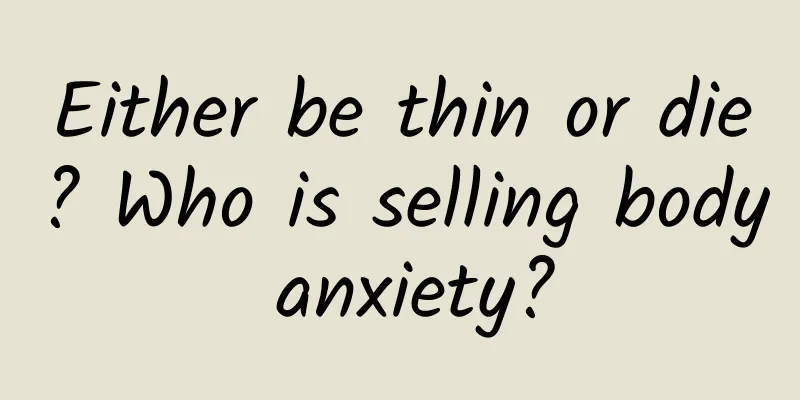Either be thin or die? Who is selling body anxiety?

|
From the time I started to pay attention to appearance anxiety until now, there is an English phrase that I have never been sure how to translate, and that phrase is **" Thin ideal****" , which roughly means that "thinness is ideal". Since this phrase was first used to describe women's attitude towards slim figures, believing that the thinner the better, some domestic scholars, including me, use the translation "以瘦为美". However, this translation also has problems, because both at home and abroad, "Thin ideal" now refers to more than just the beauty of appearance or body shape (of course, "beauty" does not necessarily refer to appearance). PART. 0 1 “Thin” = beauty + health + perseverance + success + happiness? Over the past four decades, the word "thin" has become more and more popular in Chinese. From a character associated with "weak" and "poor", it has become not only associated with beauty, but also with health, perseverance and success . However, when people talk about perseverance, they think more of ordinary people like Yugong who decided to move mountains. Thin ideal actually reflects the current distorted aesthetics. Not only women, but more and more men are beginning to accept this concept. You can think about it, is what conforms to the current aesthetics necessarily healthy? For most ordinary people like you and me, being thin and successful is unlikely to be related. **A woman's success has never been, is not, and will never be associated with being fat or thin. **Although many people think they are fat - our data shows that more than 73% of female college students think they are fat, it seems that very few thin people think they are successful from the bottom of their hearts. **People also have an illusion that being thin or conforming to popular aesthetics is related to happiness. This illusion is especially popular among young people. **However, for most middle-aged people, it does not require much psychological knowledge. Just go through the people you know in your mind and you will find that happiness has little to do with the extent to which an individual conforms to popular aesthetics. PART. 0 2 Cognition can also bring dangers It is a very dangerous idea to associate thinness with beauty, health, perseverance, and even success and happiness, and to think that "thinness is ideal", because cognition is powerful. This idea is far less harmful to middle-aged and elderly people than it is to young people and minors. Eating less and exercising more are the ways most people try to lose weight. Many teenagers will tell their parents that "I'm just not hungry and have no appetite" and thus avoid breakfast. Studies have found that some teenagers use coffee or cigarettes to suppress their desire for hunger. Some people even run on the treadmill in the gym until they are exhausted; others have learned to induce vomiting, mistakenly believing that this can "have the best of both worlds" - both fill their stomachs and lose weight. In fact, this method not only fails to control weight, but is also closely related to a group of mental illnesses - eating disorders. Although eating disorders are a group of rare mental illnesses, they are in a period of rapid development in our country. In addition, equating weight control with perseverance and self-control also ignores individual differences in metabolic rates and the impact of genetics on weight and body shape. As a counselor, I have encountered patients with obvious symptoms of binge eating. What they all have in common is that they think that as long as they are willing to starve themselves, they will definitely lose weight. Some people can indeed lose weight, but for others, it may be counterproductive. Image source: Copyright Library The human body is a beautifully designed thing. When you feel that you are short of energy, increasing your energy intake is a natural choice. Therefore, after one strict diet after another, symptoms of binge eating may slowly appear. In addition, doing things that are not allowed is always particularly happy. For people who always starve themselves, eating is a kind of happiness. Sometimes they will eat a lot of things that they usually find unpalatable, or even things they would not eat at all. Some people's lives will gradually be controlled by the desire to eat - many young people spend their hard-earned money every month on buying food, binge eating and vomiting, and they can't extricate themselves from the vicious cycle. PART. 0 3 I am worried about being trafficked, what should I do? Some content that spreads the Thin ideal may be very covert. Maybe there is no shouting "I am trying to beautify thinness", but in fact every action is promoting thinness and selling appearance anxiety. **As ordinary people, when faced with such content, what should we do? **Some scholars believe that we can think about the following key questions: 1. Who released this content? 2. Why did he release this information? 3. Is there a special timing for releasing this content? 4. Who will be able to profit from this content? 5. Is there any important information missing from these messages (such as how to control weight and whether there have been any problems during the weight control process.) We usually call this content media literacy . Many studies have consistently confirmed that exposure to thin ideal information will lead to an increase in appearance anxiety. Researchers speculate that improving media literacy may reduce the impact of thin ideal media content on people's appearance satisfaction. Generally speaking, media literacy does not automatically develop as we are exposed to the media for a longer period of time. If we lack media literacy, the more media we are exposed to, the greater the negative impact of media information on individuals. However, media literacy can be cultivated. In one study, experts conducted an experiment on 127 girls aged 10-13 in the UK. The researchers asked some girls to watch pictures of very thin models, and found that their satisfaction with their bodies decreased; for other girls, the researchers asked them to watch a video related to media literacy before watching the pictures of super-thin models, and found that the body satisfaction of this group of girls did not decrease. Back to each of us, there are many more valuable things in life than pursuing "thinness". Don't be trapped by the numbers on the scale. We all have amazing bodies. Respecting, caring for and enjoying ourselves should be the correct attitude towards the present. Author: Wang Kui Author information: Doctor of Psychology, Level 2 Psychological Counselor Member of the editorial board of Elsevier’s academic journal Body Image |
<<: What condiments did the ancient people who only ate dry food use in their cooking?
Recommend
Xueersi’s promotion case study on the activity of bringing up new employees
Xueersi is one of the twin stars in the education...
7 SEM promotion creative title routines, have you used them all?
Internet promotion, especially mobile Internet pr...
This parasite can kill people, but it's a ray of hope for cancer patients
Injecting live parasites into the human body can ...
Baidu Tieba traffic diversion tips!
Our topic today is mainly to share with you our t...
A sudden landslide in Sichuan has caused more than 30 people to lose contact! How to avoid disasters scientifically?
At around 11:50 on February 8, a landslide occurr...
iPhone 12 real machine exposed! Design pays tribute to iPhone 4, battery is greatly reduced, price may be the biggest surprise
Apple can’t afford to lose with the iPhone 12 ser...
The Paris Olympics is about to open, and these competition venues are actually temporary?
References: [1] Liu Xiliang, Liu Yingliang. Appli...
How to operate Wukong Q&A? Share 4 tips!
Last year, Wukong Q&A provided subsidies of 1...
Does Ocpc have a decline period? How to optimize?
After I published several Q&A articles about ...
Does advertising have an “effect”?
The advertising industry usually uses superficial...
Spring Festival red envelope war: the biggest loser is the bank
[[128082]] There is no doubt that Alibaba and...
The most difficult 618 sales data grew by 100% against the trend, TCL created the best combination of high-end products
The repeated epidemics, obstructed logistics, the...
Android easily implements RecyclerView suspension bar
When we are browsing Instagram news, have you not...
14 of them appear at once? The "bugs" are resurrected, be careful not to be sprayed by the "stinky fart bugs"...
As spring arrives and flowers bloom, all kinds of...
My friends, these "dates" that are bigger than eggs are in season and are really delicious!
Have you ever eaten apple dates? They are emerald...









